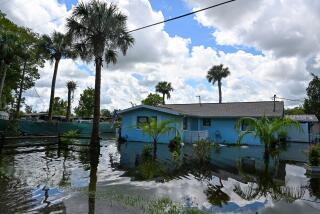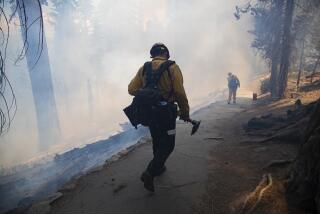Obama’s State of the Union: Topic by topic
Climate change:
By Neela Banerjee
WASHINGTON -- In his State of the Union address, President Obama articulated a subtle but noticeable shift away from his longstanding discussion of climate change in almost entirely economic terms to making a moral argument for the need to act.
“For the sake of our children and our future,” he said, “we must do more to combat climate change.”
“Yes, it’s true that no single event makes a trend,” Obama said. “But the fact is, the 12 hottest years on record have all come in the last 15. Heat waves, droughts, wildfires, and floods -- all are now more frequent and intense. We can choose to believe that Superstorm Sandy, and the most severe drought in decades, and the worst wildfires some states have ever seen were all just a freak coincidence. Or we can choose to believe in the overwhelming judgment of science -- and act before it’s too late.”
His new, blunter language on climate change builds on rhetoric he used during the Democratic National Convention, in his election night victory speech and his Inaugural address three weeks ago. Obama did not follow up his mention of climate change by unveiling any new major initiatives. But he told legislators that with or without them he would act on it.
“I urge this Congress to pursue a bipartisan, market-based solution to climate change, like the one John McCain and Joe Lieberman worked on together a few years ago,” Obama said, speaking of the Senate veterans. “But if Congress won’t act soon to protect future generations, I will. I will direct my Cabinet to come up with executive actions we can take, now and in the future, to reduce pollution, prepare our communities for the consequences of climate change, and speed the transition to more sustainable sources of energy.”
The president has public opinion on his side, with polls late last year showing that a majority of Americans now consider climate change a serious problem. He also has initiatives at the ready that were being crafted toward the end of his first term, most notably rules to curtail greenhouse gas emissions from new power plants.
Environmentalists praised Obama’s new approach, but key decisions ahead are likely to test his commitment. Environmentalists hope to see the administration reject the building of the Keystone XL pipeline, which they say would amp up greenhouse gases. They also expect the Environmental Protection Agency to push new rules to cut emissions of greenhouse gases from existing power plants.
“He was strong on problems but weak on solutions after saying climate change was a moral crisis and an economic opportunity,” said Michael Brune, president of the Sierra Club. “He didn’t give us much to chew on as far as meeting the challenge.”
Minimum wage:
By Jim Puzzanghera
WASHINGTON -- President Obama focused his State of the Union address on boosting the nation’s slow-moving economic recovery, saying the first priority “is making America a magnet for new jobs and manufacturing.”
Obama unveiled some new initiatives, such as raising the minimum wage, opening new government-backed Manufacturing Innovation Institutes, and a program to fix crumbling infrastructure.
He also pushed lawmakers to approve proposals that stalled in Congress last year, including making it easier for some homeowners to refinance their mortgages, eliminating some corporate tax breaks, and enacting the so-called Buffett Rule to ensure that millionaires pay a minimum income tax rate.
“Now is our best chance for bipartisan, comprehensive tax reform that encourages job creation and helps bring down the deficit,” Obama said. “The American people deserve a tax code that helps small businesses spend less time filling out complicated forms and more time expanding and hiring.”
The most significant new proposal was to raise the national minimum wage in stages to $9 an hour by 2015 from $7.25, and to tie the rate to inflation.
“This single step would raise the income of millions of working families,” Obama said. “For businesses across the country, it would mean customers with more money in their pockets.”
Obama also proposed a $50-billion program called “Fix-It-First” that would hire people to repair nearly 70,000 structurally deficient bridges nationwide and other infrastructure.
In addition, the president said he would use existing money to open three new Manufacturing Innovation Institutes after the success of the first such facility, in Youngstown, Ohio, where an unused warehouse has been converted into a state-of-the art 3D printing lab. Obama called for Congress to authorize $1 billion to create a network of 15 such institutes.
Gun control:
By Melanie Mason
WASHINGTON — Much of President Obama’s rhetoric on gun violence in his State of the Union address focused on a seemingly basic appeal to Congress: hold a vote.
His repeated refrain that victims of gun violence “deserve a vote” served as the speech’s emotional crescendo. But it also underscored just how daunting is the legislative path facing gun control. Congress has not held floor votes on major changes to gun laws since the 1990s.
Obama made cursory mentions of the components of his gun policy proposals: universal background checks, a ban on assault weapons and high-capacity magazines, and stronger anti-trafficking laws.
“Each of these proposals deserves a vote in Congress. If you want to vote no, that’s your choice,” Obama said. “But these proposals deserve a vote. Because in the two months since Newtown, more than a thousand birthdays, graduations and anniversaries have been stolen from our lives by a bullet from a gun.”
One of those lives, he noted, was that of Hadiya Pendleton, a 15-year-old who marched in his inaugural parade last month. One week later, she was killed in Chicago, an unintended victim of gun violence.
“Hadiya’s parents, Nate and Cleo, are in this chamber tonight, along with more than two dozen Americans whose lives have been torn apart by gun violence. They deserve a vote,” Obama said.
Her parents, sitting next to First Lady Michelle Obama, listened somberly. Hadiya’s mother, Cleopatra Cowley-Pendleton, flashed a brief smile at the president’s mention of her daughter’s love of Fig Newtons and lip gloss.
The president continued: “Gabby Giffords deserves a vote. The families of Newtown deserve a vote. The families of Aurora deserve a vote. The families of Oak Creek, and Tucson, and Blacksburg, and the countless other communities ripped open by gun violence – they deserve a simple vote.”
The chorus was picked up by lawmakers, mostly Democrats, who chanted “vote, vote.” Many in the hall in both parties wore green ribbons in show of support for Newtown, Conn., the site of a mass shooting at an elementary school in December.
A number of Democratic lawmakers also invited victims of gun violence and their loved ones as guests. Rep. Janice Hahn (D-San Pedro) brought the Rev. E. Winford Bell, a Los Angeles-based Baptist pastor who founded a faith-based anti-violence organization after his son was injured in a 2009 shooting. Hahn said Bell and others could prod her colleagues in Congress to act.
“Sometimes the president will have one issue, and he’ll have one person in the gallery stand up,” Hahn said. “This time, there [are] a lot of people who are guests who have suffered from gun violence. And I think that is a powerful message and voice for Congress.”
Job creation through minimum wage hikes:
By Don LeeWASHINGTON -- Many mom-and-pop businesses were among the most vocal critics of President Obama’s healthcare overhaul as being too costly, and now they’re likely to howl at his latest proposal: an increase in the federal minimum wage.
But the proposal drew immediate praise from unions and worker advocacy groups. And the idea is likely to find support from many newly hired workers in this tough recovery.
Since early 2010, when the economy began to create jobs, about one-third of the 6 million private-sector jobs added to the economy have been in three sectors that pay relatively low wages: restaurants, retail trade and temporary help.
Obama, in his state of the union message, called for a boost in the minimum pay rate to $9 an hour from the current $7.25 and to tie that to a cost of living increase, saying that “in the wealthiest nation on Earth, no one who works full-time should have to live in poverty.”
A single person who works full-time today in a minimum-wage job would gross about $15,100, which is above the federal poverty line. Congress last passed a minimum-wage increase in 2007, and Obama noted that since then 19 states had bumped up their minimum hourly pay rates.
In reviving a proposal that he made as a presidential candidate in 2008, Obama probably got strong support from his chief economic advisor, Alan Krueger, whose research findings have poked holes in the commonly held view that increasing the minimum wage leads to higher joblessness.
Still, the president’s new push for a minimum wage increase is likely to draw fire from many who believe it will hurt the economy, especially small businesses, which as a whole have lagged behind in growth and hiring during this recovery.
Immigration reform:
By Brian Bennett
WASHINGTON – President Obama pressed Congress to overhaul immigration laws “in the next few months” during his State of the Union speech, but he did not dwell on the issue, a signal that he doesn’t want to upset delicate negotiations unfolding in the House and the Senate.
“Let’s get this done,” Obama said several times, as the chamber cheered. “Send me a comprehensive immigration reform bill in the next few months, and I will sign it right away.”
Marshall Fitz, an immigration expert at the Center for American Progress, a liberal think tank, said Obama wanted to give Congress time to negotiate and draft a bill.
“There’s an awareness on his part that too much involvement can hurt the process,” he said.
Obama wove his immigration remarks into his larger proposals to stimulate the economy and create jobs. He emphasized that prominent business and labor leaders have said “the time has come” to pass an immigration bill.
Obama repeated his call for a bill that includes additional border security measures and creates a pathway to “earned” citizenship for those who pass a law enforcement check, pay back taxes and a penalty, and learn English.
The effort to forge a compromise has tacit support from Republican leaders in Congress, who see reaching out to Latino families as important for the future of the GOP. But some Republicans are staunchly opposed to expanding legal immigration and are unlikely to agree to offering legal status to illegal immigrants.
“If the president was serious about creating jobs and spurring economic growth, amnesty for illegal immigrants would not be on his agenda,” Rep. Lamar Smith (R-Texas) said in a statement Tuesday.
Smith, who has voted to reduce legal immigration levels for more than two decades, said the president’s proposal, which Obama outlined in a Jan. 29 speech in Las Vegas, “will make it easier for 11 million illegal immigrants to compete with hard-pressed American workers.”
Efforts to hammer out a compromise have accelerated in both the House and the Senate in recent weeks.
In the Senate, a bipartisan group of four Democrats and four Republicans has begun meeting twice a week. Aides are drafting a bill that includes a route to legal status, and more visas for highly skilled or highly educated applicants.
The Democrats – Sen. Charles E. Schumer of New York, Richard J. Durbin of Illinois, Bob Menendez of New Jersey, and Michael Bennet of Colorado – are scheduled to meet Obama on Wednesday afternoon to brief him on the group’s progress.
Obama has said he wants to see the Senate introduce an immigration reform bill next month. If he doesn’t, he has promised to send his own version to the Senate and ask the chamber to vote on it. Activists say that could poison the spirit of cooperation now underway.
Obama has been “really clear… that he’s not going to wait forever,” said Fitz, who was in a group of immigration advocates and labor leaders who met with the president in the West Wing last week. “This isn’t going to get dragged into a back room and be allowed to die a slow and ugly death.”
Educational programs:
By Howard Blume
President Obama focused Tuesday night on the ends of the education spectrum — preschool and college. He said in his State of the Union address that his administration would work with states to provide a high-quality preschool program for all. He said only 3 of 10 children currently enroll in such programs, which he said were proven to increase graduation rates and reduce teen pregnancy rates and violent crime.
There has been controversy, however, over the success of federally funded Head Start programs, which, critics have said, are not of consistently high quality. There’s also a persistent debate over whether early childhood programs should focus on academic skills or developing creativity and social skills. Either way, the president is likely to meet with resistance if a preschool initiative means a substantial new outlay of federal funds.
Obama also compared American high school graduates with their German peers, who, he said, can leave high school with the equivalent of a community college degree. Obama was not specific about how he would accomplish the same in the United States, although he said there are model programs in this country to emulate.
One of his most interesting and specific proposals dealt with colleges.
“Colleges must do their part to keep costs down,” Obama said, echoing campaign themes voiced by himself and Republican opponent Mitt Romney during the presidential race.
On Tuesday, Obama said he wanted to link federal funding to the affordability and value a college offers. And, he said, the administration is prepared to roll out a score card listing which schools do and do not offer the most “bang for the educational buck.”
Follow Politics Now on Twitter and Facebook
More to Read
Get the L.A. Times Politics newsletter
Deeply reported insights into legislation, politics and policy from Sacramento, Washington and beyond. In your inbox three times per week.
You may occasionally receive promotional content from the Los Angeles Times.






